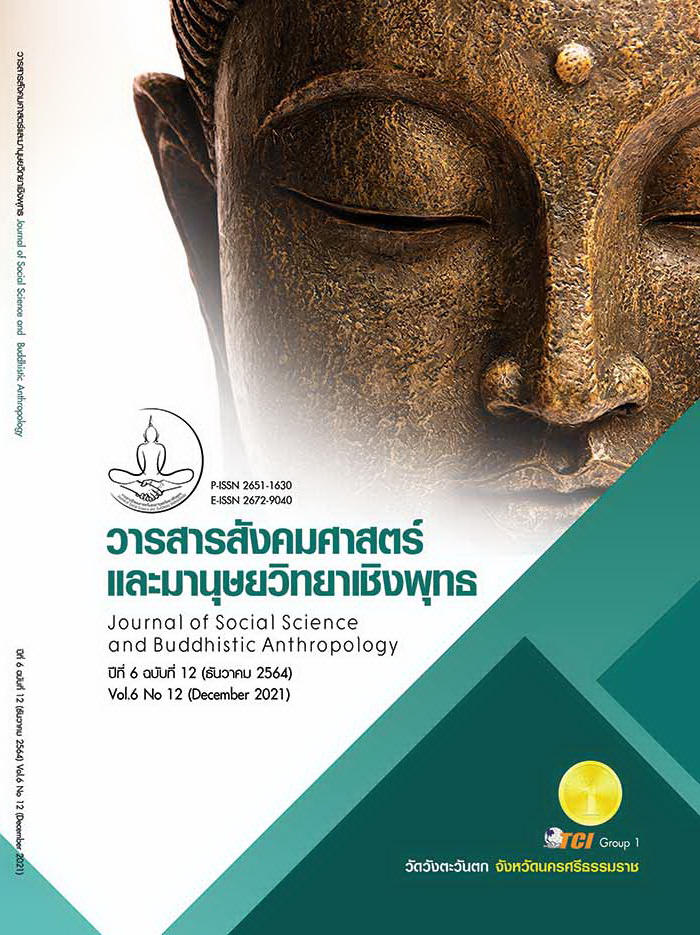THE CAUSAL FACTORS OF INNOVATIVE WORK BEHAVIOR AFFECTING JOB PERFORMANCE OF RESEARCH AND DEVELOPMENT PERSONNEL IN MINISTRY OF HIGHER EDUCATION, SCIENCE, RESEARCH AND INNOVATION
Keywords:
innovative work behavior, innovative self-efficacy, self-leadership, outcome expectations, job performanceAbstract
The objectives of this research article were to study influence the causal factors of innovative work behavior affecting job performance of research and development personnel in Ministry of Higher Education, Science, Research and Innovation. The research was quantitative methodology. The sampling method was stratified random sampling. The study samples were 560 person from Ministry of Higher Education, Science, Research and Innovation by being a research and development personnel under the structure of the Science, research and innovation Department with the main mission of conducting research. The instruments used to collect data were rating scale questionnaires (α = .863 to .961). Data were analyzed by utilizing structural equation model. The results were as follows; 1) The causal relation structural model of research and development personnel’ innovative work behavior was modified to fit with the empirical data (c2 = .014, df = 1, p = .906, RMSEA = .000, CFI = 1.000, GFI = 1.000, AGFI = 1.000). 2) Innovative work behavior was directly affected by innovative self-efficacy, self-leadership and outcome expectations with statistical significance at the .o1 level. These variables together predicted innovative work behavior at 55.10 percent. 3) Innovative work behavior was affected .537 direct effects on job performance with statistical significance at the .o1 level. 4) Latent variables, such as innovative self-efficacy, self-leadership, outcome expectations and innovative work behavior were together predicted appropriate job performance at 60 percent.
References
ชูศรี วงศ์รัตนะ. (2560). เทคนิคการสร้างเครื่องมือวิจัย : แนวทางการนำไปใช้อย่างมืออาชีพ. กรุงเทพมหานคร: อมรการพิมพ์.
ธัชกร ภูวพัฒนดล. (2562). ยุทธศาสตร์การพัฒนาสถาบันการศึกษาขั้นสูงของกองทัพบกสู่การเป็นองค์กรแห่งการเรียนรู้ในยุคประเทศไทย 4.0. วารสารศรีปทุมปริทัศน์ ฉบับมนุษยศาสตร์และสังคมศาสตร์, 19(2), 22-34.
วิกาวี วัฒนวิจารณ์. (2557). ความสัมพันธ์ระหว่างการรับรู้ความสามารถของตนเอง ความคิดสร้างสรรค์กับพฤติกรรมสร้างนวัตกรรม: กรณีศึกษากลุ่มบริษัทผู้ให้บริการด้านการสร้างแบรนด์แบบครบวงจรแห่งหนึ่ง. ใน สารนิพนธ์บริหารธุรกิจมหาบัณฑิต สาขาวิชาบริหารธุรกิจ. มหาวิทยาลัยธรรมศาสตร์.
สำนักงานสภานโยบายการอุดมศึกษา วิทยาศาสตร์ วิจัยและนวัตกรรมแห่งชาติ. (2562). สถิติข้อมูลวิทยาศาสตร์ เทคโนโลยีและนวัตกรรม. เรียกใช้เมื่อ 8 สิงหาคม 2562 จาก http://stiic.sti.or.th/stat/
Bandura, A. (1991). Self-efficacy mechanism in physiological activation and health-promoting behavior. In J. Madden, IV (Ed.), Neurobiology of learning, emotion and affect (pp. 229-269). New York: Raven.
De Jong, J. P. & Den Hartog, D. N. (2010). Measuring innovative work behavior. Creativity and Innovation Management, 19(1), 23-26.
Gerber, E. et al. (2012). Developing an Innovation Self-Efficacy Survey. Seattle, WA.: Frontiers in Education Conference.
Hair, J. et al. (2014). Multivariate Data Analysis. (7th ed.). United States of America: Pearson New International Edition.
Hooper, D. et al. (2008). Structural Equation Modelling: Guidelines for Determining Model Fit. The Electronic Journal of Business Research Methods, 6(1), 53-60.
Horne, D. (2013). Leading Others Starts with Leading One’s Self. Retrieved August 2, 2019, from https://medium.com
Houghton, J. D. et al. (2012). The abbreviated self-leadership questionnaire (ASLQ): A more concise measure of self-leadership. International Journal of Leadership Studies, 7(2), 216-232.
Hsiao, H. C. et al. (2011). The Impact of Self-efficacy on Innovative Work Behavior for Teachers. International Journal of Social Science and Humanity, 1(1), 31-36.
Manz, C. C. & Neck, C. P. (2004). Mastering self-leadership: Empowering yourself for personal excellence. (3rd ed.). Upper Saddle River, NJ: Pearson Prentice Hall.
Sosik, J. J. & Jung, D. I. (2010). Full range leadership development: Pathways for people, profit and planet. New York: Routledge.
Teimouri, H. et al. (2009). The Role of Self-Leadership in Innovation and Creativity Employee. The International Journal of Knowledge, Culture, and Change Management: Annual Review, 9(1), 49-62.
Woodman, R. W. (2008). Creativity and Organizational Change: Linking Idea and Extending Theory. Handbook of Organization Creativity. New York: Taylor & Francis Group.
Yeoh, K. et al. (2013). A Conceptual Review of Innovative Work Behavior in Knowledge Intensive Business Services among Knowledge Workers in Malaysia. International Journal of Business, Humanities and Technology, 3(2), 91-99.
Yuan, F. & Woodman, R. W. (2010). Innovative Behavior in the Workplace: The Role of Performance and Image Outcome Expectations. Academy of Management Journal, 53(2), 323-342.
Downloads
Published
How to Cite
Issue
Section
License
Copyright (c) 2021 Journal of Social Science and Buddhistic Anthropology

This work is licensed under a Creative Commons Attribution-NonCommercial-NoDerivatives 4.0 International License.









